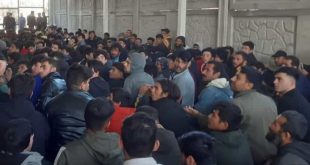Afghanistan is seen as a land of opportunities by warlords and powerful individuals. They are always part of the system whether they are sitting in the power corridor or outside. Their say always matter especially when Afghans have such a weak central government. Whenever the government ignores them for the sake of future generations, they threaten to climb mountains and challenge writ of the government. They are enjoying colors of the life when poor citizens of the country are fleeing their native towns. Children of these so-called powerful individuals are studying in foreign universities when ordinary citizens are thinking about ways how to reopen schools in their areas.
Ground realities suggest that the country has two systems—one for rich and another for poor. Elite class enjoys legal immunity, improved security and power. On the other hand over 90 percent Afghans belong to the deprived class. This class has no say in the government affairs that they form with the power of their votes. The deprived class happily pays direct and indirect taxes as well as utility bills. They know that the country is passing through critical juncture and every penny matters. This is called patriotism. So majority of the people are patriots. They support every productive decision of the government. But at the same time, they condemn the double system and are tired of the influential people who are satiating their greed at the cost of national interests and public lives.
List containing names of those individuals and institutes that owe millions in electricity bills to Da Afghanistan Breshna Sherkat elaborates the double system in the country very well. Utility bills are part of the national wealth. The list tells about those who are plundering the national wealth and preventing Afghanistan from standing on its feet. Government officials, offices, lawmakers, powerful individuals and public owe staggering AFN 3.3 billion. Government institutes that enjoy great authority and influential people including the lawmakers and government officials have denied clearing the dues. The state-owned power distribution company even came with the installment suggestion to recover the dues but it did not work.
Da Afghanistan Breshna Sherkat cannot cut electricity supply to defaulting customers because the former has less authority and power compared to the latter. Recovery of the dues is crucial to keep the flow of electricity. If the dues were not cleared, the company would be unable to import electricity from the neighboring countries. Therefore, the Ghani-administration should take tough decisions to prevent a serious crisis. As a first step, the government should blacklist all those individuals who are not ready to pay electricity bills. Heads of the defaulted institutes should be fired. The government should also direct the power distribution company to disconnect electricity supply to the defaulters till they clear the dues. The unity government must follow a policy of zero tolerance against the defaulters.
 Afghanistan Times
Afghanistan Times



